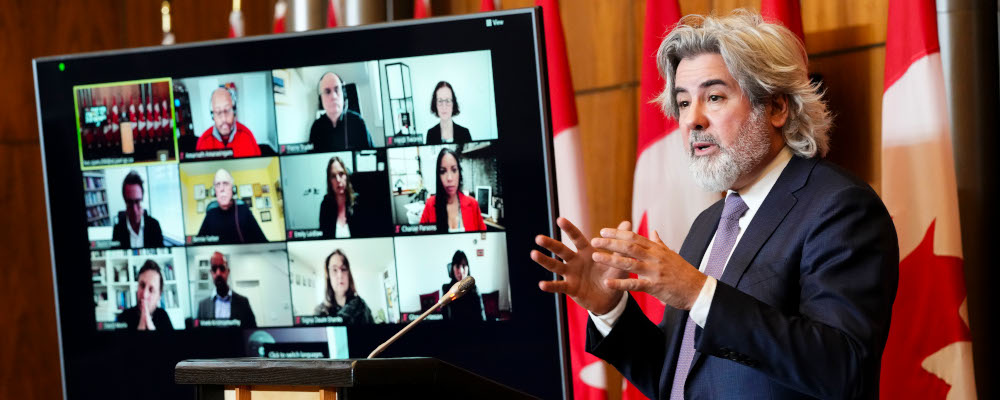One of the Trudeau government’s chief political accomplishments is the repeal of many of the Harper government’s policies. Its first budget alone got rid of income splitting for families, tax credits for children’s arts and fitness, and the doubling of the Tax-Free Savings Account contribution limit. These and other policy reversals have led one commentator to characterize the Trudeau government’s agenda as “undoing Harperism.”
Yet there’s a strong argument that the most significant case of the Trudeau government’s undoing of its predecessor’s policies actually extends to the Chretien era in the form of its now controversial Bill C-11.
As we’ve discussed before at The Hub, the Online Streaming Act,Backgrounder: The Government of Canada introduces legislation to support the next generation of Canadian artists and creators https://www.canada.ca/en/canadian-heritage/news/2022/02/backgrounder-the-government-of-canada-introduces-legislation-to-support-the-next-generation-of-canadian-artists-and-creators.html which will soon go to the Senate for review, extends the Broadcasting Act’s provisions and, in turn, the Canadian Radio-Television and Telecommunications Commission (CRTC)’s regulatory reach to the internet. The net effect is that streaming services like Netflix and YouTube will be subject to Canadian content regulations (typically referred to as CanCon rules) and mandated to make financial contributions to the country’s bureaucratic system of content subsidies.
Yet we haven’t discussed the origins and rationale for exempting the internet from the CanCon regime in the first place. That decision, taken in 1999 by the Chretien government, is in retrospect one of the most far-sighted and important policy choices of the previous Liberal government. Bill C-11 now threatens it.
As the internet was emerging as a platform for audio and video content, there was a question about whether the Broadcasting Act’s legal framework (including the CanCon rules) ought to cover it. The CRTC carried out public consultations on this issue through the summer of 1999 and then issued a directive (sometimes referred to as the New Media Directive) in late December.Exemption order for new media broadcasting undertakings https://crtc.gc.ca/eng/archive/1999/pb99-197.htm
What’s striking about the directive in hindsight is how its underlying thinking about the positive-sum dynamic of the internet and the growing global potential for Canadian content diverges from the government’s defensive and nationalistic arguments in favour of Bill C-11.
The basic idea then was that an unregulated internet would actually advance the goals of greater Canadian content better than subjecting it to the Act and its accompanying rules and regulations. The directive stated: “The Commission expects that the exemption of these services will enable continued growth and development of the new media industries in Canada, thereby contributing to the achievement of the broadcasting policy objectives, including access to these services by Canadians.”
The initial directive has been subsequently reviewed over the years and largely upheld as the basis for how the CRTC treats internet-based networks and content. The core insight about the internet’s positive-sum effects on the quantity and reach of Canadian content has endured as the underlying basis for policymaking from the Chretien government to the Harper government.
Consider, for instance, a 2009 directive that maintained the new media exemption and even expanded it to the content accessed on smartphones.Review of broadcasting in new media https://crtc.gc.ca/eng/archive/2009/2009-329.htm Based on consultations with content creators and industry players at the time, the CRTC observed:
“Many parties submitted that the Commission’s hands-off approach has been instrumental in allowing new media to flourish to this point and that regulatory intervention remains unnecessary for continued development and innovation in the new media environment.”
Therefore the CRTC concluded:
“The Commission retains its view set out in the New Media Exemption Order that the exemption of new media broadcasting undertakings will enable continued growth and development of the new media industries in Canada, thereby contributing to the achievement of the broadcasting policy objectives, including access to those services by Canadians.”
It’s far from obvious what has changed over the past 13 years or so that would alter this key insight. The fundamental goal of producing and promoting Canadian content has only expanded as content creators have come to leverage new and emerging internet-based platforms to reach domestic and global audiences. It speaks to the prescience of the 1999 decision that the Chretien government understood this potential better than the Trudeau government seems to today.
Exempting the internet from regulation has contributed to an unprecedented burst of creativity, innovation, and success for Canadian creators. Canadian programming on Netflix, YouTube, and other streaming sites is winning awards and reaching huge audiences. As successful YouTuber J.J. McCullough recently told‘Hello friends’: J.J. McCullough explains why Canadian YouTubers fear the government’s online streaming bill https://thehub.ca/2022-06-02/hello-friends-j-j-mccullough-explains-why-canadian-youtubers-fear-the-governments-online-streaming-bill/ a parliamentary committee:
“The tremendous success and even worldwide fame of many Canadian YouTubers in the absence of government regulation should invite questions about the necessity of Bill C-11. An unregulated YouTube has been a 17-year experiment—and the result has been an explosion of popular Canadian content, produced by Canadians of every imaginable demographic.”
The broader experiment of the New Media Directive has effectively proven that there’s a significant global demand for Canadian content and that national broadcasting policy shouldn’t assume otherwise. The cultural defensiveness and protectionism of previous eras were wrong.
Yet in spite of the evidence, the Trudeau government continues to adhere to this misguided thinking. Its views about the internet and Canadian culture reflect a zero-sum understanding that belies the facts and underestimates Canadian content creators.
For a government that portrays itself as cosmopolitan and futuristic, Bill C-11 has shown the Prime Minister and his Canadian Heritage Minister to be retrograde and parochial on these matters. If they really want to support the “next generation of Canadian artists and creators”,Government of Canada Introduces Legislation to Support the Next Generation of Canadian Artists and Creators https://www.canada.ca/en/canadian-heritage/news/2022/02/government-of-canada-introduces-legislation-to-support-the-next-generation-of-canadian-artists-and-creators.html they won’t undo the Chretien government’s inspired decision on internet regulation and the successful market-driven experiment that it has spawned for more than twenty years.
Recommended for You

The Weekly Wrap: It’s time to cut through Chesterton’s Fence and implement sweeping reform in Canada

The Week in Polling: Young Canadians delay milestones due to high costs, Liberals lose the youth vote, and most Canadians fear a Trump-Vance White House

Ginny Roth: J.D. Vance, Pierre Poilievre, and how they slice their economic pie

David Polansky: As President Biden leaves the race, will the Democratic Party hodgepodge hold?









